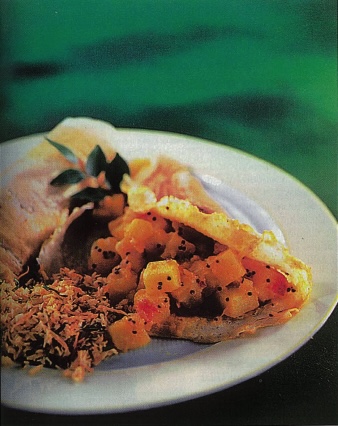YOGI’S YUMMIES
HEALTHY AND DELICIOUS IS THE THEME FOR THIS COOKBOOK
By Tara Katir, Kapaa, Hawaii
One day my mother decided to cook a special treat,” writes Swami Saradananda of Sivananda Yoga Vedanta Centre, Canada. “She bought some live lobsters, filled the bath tub with water so they could await their fate in comfort, and put a big pot of water on to boil. As the lobsters were dropped into the boiling water, I heard their screams. The thought crossed my mind, ‘How could I cause such unspeakable suffering to my fellow beings, just because I liked the taste of their flesh?’ I understood first hand the yogic principle of ahimsa (nonviolence) and never ate meat or fish again.” The Sivananda Yoga Vedanta Centres’ The Yoga Cookbook, Vegetarian Food for Body and Mind [159 pages, Gaia Books Limited, us$16.00] is ample and delicious testimony to Saradananda’s conversion to vegetarianism. As project coordinator, she and a dedicated team of writers, cooks and photographers have produced an outstanding collection of recipes and explanations. The lacto-vegetarian diet of grains, pulses, fruits, vegetables, nuts, seeds and dairy products, and the subtle effects these foods have on the mind and prana, are the heart of this book.
Sattvic (quiescence), rajasic (passion) and tamasic (darkness) are the three qualities that make up all of nature. “Yogis believe not only that ‘you are what you eat’ but also you eat those foods that reflect your own level of mental and spiritual purity… The yogic diet is based on sattvic foods.” A brief description of the three kinds of foods, guidelines for healthy eating habits and suggested replacement foods for eggs, cheese, meat and milk provide a perfect starting point for the recipes to follow. Although dairy products are traditionally part of a vegetarian’s diet, they caution using milk products from antibiotic- and hormone-fed cows.
“Soup Samskaras,” “Glorious Grains,” “Protein Prana” and “Sattvic Sweets” are but a few of the enticing chapters of gastronomical delights. Recipes are drawn from a wide range of traditions, including Indian, Middle Eastern and European–and range from corn fritters to vegetable paˆté to chocolate truffles and burfi–all designed with healthy eating in mind. The merits of fasting, its possible side effects and how to break a fast conclude this guidebook for healthy eating.
The Taittiriya Upanishad succinctly states, “Verily, this person consists of the essence of food” or in other words, “You are what you eat.” An excellent vegetarian cookbook featuring a variety of international foods. Bon Appetite!
CHINMAYANANDA UP CLOSE
A wonderfully affectionate and joyous book celebrating the life of Swami Chinmayananda (1916-1993) is Rudite Emir’s At Every Breath, A Teaching [318 pages, Chinmaya Publications, $20). Collecting personal experiences from Swami’s worldwide congregation, Emir has lovingly crafted a retrospective of a lifetime serving others as seen through the eyes of his devotees. Those close to Swami understood his teaching did not cease when a lecture ended, but rather his influence on lives was total. Summed up by one devotee, “He was the architect of my life.”
Capturing the spirit of the guru is the short vignette of the melancholy devotee who missed Swami after his passing. While sorting his photos for a publication, one is found printed in reverse. Holding it to a mirror it read, as if a message from beyond, “‘Come back,’ you say; even though you admit ‘we know you have never left.’ The program of work is sent to me by the Proprietor. I don’t decide things. Your request is with reverence sent to Him who orders all activities. Live Vedanta, reach That Destination where having met we shall never part. Reach There through love, service and purity.”
As one devotee described Swami, “His life itself is a scripture.” Enjoy every page and be inspired by a lifetime devoted to
sannyasa, the razor’s edge path of steadfast service. The book answers questions such as: How can I hasten my progress on the spiritual journey? How can I meet the demands of life without undue stress? How can I rid myself of a negative habit? How can I succeed in business while staying true to my values? How can I transcend the limitations of my body, mind and intellect and rest in pure Consciousness?
Author Rudite Jirgensons Emir was a student of Swami since 1966 until his passing in 1993. Born in Riga, Latvia, she emigrated to the United States as a young girl. Under Swami’s guidance, she was the founding editor of Mananam, a quarterly journal of Vedanta.
PUBLISHERS: GAIA BOOKS LTD, 66 CHARLOTTE ST, LONDON W1P 1LR UNITED KINGDOM. CHINMAYA PUBLICATIONS, P.O. BOX 129, PIERCY, CALIFORNIA, USA 95587. web: www.chinmaya.org


